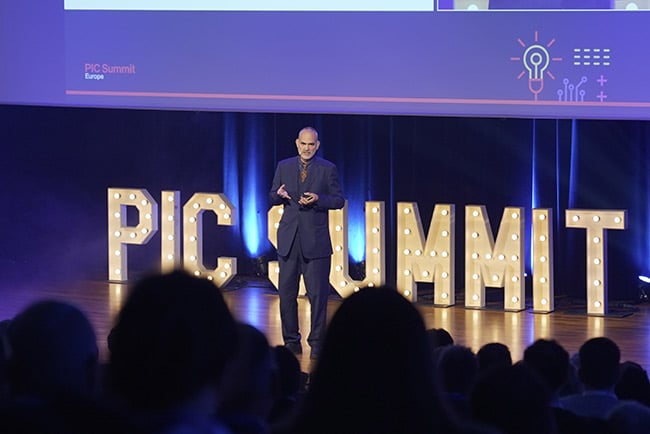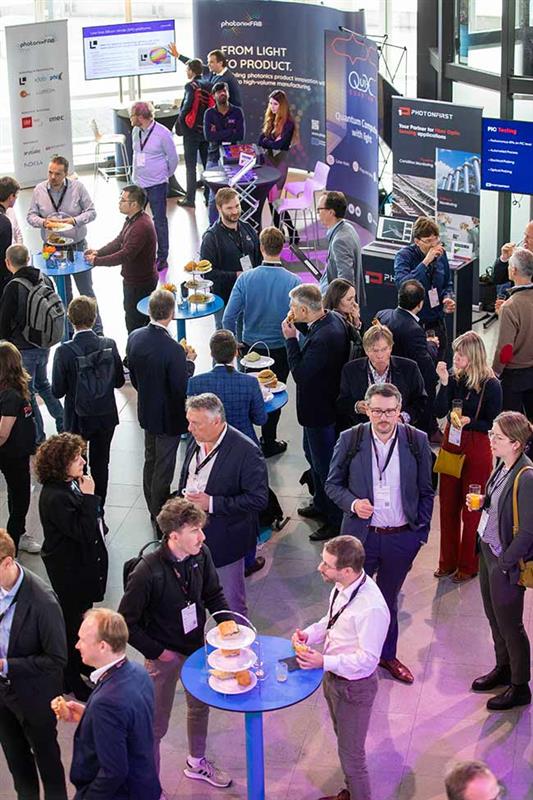BY EELKO BRINKHOFF, PHOTONDELTA
Earlier this fall, more than 700 industry leaders from the photonic chip and semiconductor industry convened in Eindhoven, Netherlands. The forum, PIC Summit Europe 2024, was one of the largest events to date focused strictly on the integrated photonics industry in Europe.

Eelko Brinkhoff, CEO of PhotonDelta. Courtesy of PhotonDelta.
The scale of interest in the summit indicates both the rapid growth of integrated photonics and its use cases, as well as the crossroads at which the industry — collectively — finds itself approaching. Though this sentiment and the many subthemes that it underscores are not themselves contentious, the summit did spark debate. Areas of focus included how leaders from across business, investment, government, and academia can work together to further integrate chips by standardizing processes and breaking down barriers.
The general consensus: Without a more holistic approach to the development of integrated photonics, there is a risk that it will struggle to fulfill its massive potential.
Further, this approach needs to be underpinned by different stakeholders from across different industries and countries working together.
This is not to take away from the excitement around the realization of just how transformational photonic chips could be for many industries, including those that may still qualify as nontraditional. From agriculture to healthcare, we know that this technology can play a leading role in meeting the most acute societal challenges that we face this century — principally around climate change and supply chain security.
However, translating these powerful use cases into a large, sustainable, global industry means looking at the fundamentals of production, financing, scaling, legislation, and infrastructure. How we together determine the best approach to address these questions was the focus of many of the speeches, panels, and debates that took place at PIC Summit Europe 2024.
Collaboration and standardization
Gustav Kalbe, acting director for enabling and emerging technologies of the EU Commission, provided one of the main keynote addresses. In his session, Kalbe emphasized how the importance of the European PIC industry would be reflected in the new mandate of the Commission, which is slated to start this month. This was reinforced by the historic Draghi report, focused on EU reforms, which highlighted the importance of innovative industries for Europe’s economic potential. “Integrated photonics remains a key European focus. But it is important that we come together to coordinate and collaborate — between member states and across the industry,” Kalbe said.
Kalbe’s speech also highlighted the need to streamline rules and promote innovation through the EU’s Chips Act. This theme itself should be viewed as a positive sign; without intragovernmental support and coordination, the integrated photonics industry will struggle to scale at anywhere near the pace that is required.

Gustave Kalbe, acting director, Enabling and Emerging Technologies, of the EU Commission. Courtesy of PhotonDelta.
Subsequent speakers echoed the call for standardization, emphasizing that scaling photonics innovations across industries will be difficult without common frameworks and platforms. Large countries like the U.S. and China already enjoy the advantage of being able to easily homogenize legislation across their jurisdictions to enable such an approach. Without Europe taking a similar “joined-up” approach across the EU, it risks being quickly outcompeted by these countries.
Regulatory support from the government is one thing, but there is also a need for funding to match. This is currently one of the major pinch points in the integrated photonics sector. As an industry, we are highly effective in creating compelling use cases. Yet developing the optimal environment to foster these ideas, and to facilitate their advance from a minimum viable product toward mass production and adoption will require significant funding. Unlike other sectors, such as fintech or software as a service, in which the creation of products or services is relatively inexpensive — and the infrastructure to distribute and integrate them already exists — the integrated photonics industry needs to build its own capability from the ground up. To do this quickly, significant investment is needed from both the public and private sectors. And we need closer integration with the semiconductor industry.
PhotonDelta is an example of the type of investment needed. In 2022, it received a €470 million investment from the Dutch National Growth Fund and €630 million in private funding. This funding is being used to build and scale a Dutch supply chain on the back of international cooperation (PhotonDelta opened a hub in the U.S. this year). More public/private partnerships of this nature will be required across Europe as well as every aspect of the supply chain.
Semiconductor cooperation and AI
One of the most positive aspects of this year’s summit was the sizable representation of/from the semiconductor industry, as well as large international corporations from a range of sectors. Senior spokespeople from IBM, Sony, Nokia Bells Labs, GlobalFoundries, Unilever, and NVIDIA all shared their insight on the industry. These leaders were almost unanimous in their calls for standardized manufacturing and design processes. This is because they know that integrated photonics offers a tremendous opportunity across the global economy, and the industry cannot be pigeonholed into catering to one sector. To this end, there is clear demand from the private sector for long-term roadmaps that will achieve these goals. If there is one trend to monitor heading into the new year, I believe that work will begin imminently to accomplish this.
No modern technology meetup would be complete without debate on the influence of AI — and the capacity of integrated photonics to support the development of this technology through more powerful and efficient chips was the subject of much enthusiasm. There is recognition that the future of AI, integrated photonics, and quantum computing are intertwined, and that collaboration between these industries at their relatively early stages of development is an unprecedented opportunity for broader technological advancement.
A look to the future

More than 700 attendees, spanning industry, R&D, and academia attended PIC Summit Europe 2024. Courtesy of PhotonDelta.
As with so many tech sectors, the technical skills gap that most Western nations now face is a threat to the development of the integrated photonics industry. There simply are not enough skilled people currently available to secure the industry’s long-term future. Rectifying this problem quickly is going to be a substantial challenge. It will require governments to look at how they can direct more people into careers in STEM, how academic institutions can equip students with the right skills, and how businesses can upskill existing professionals and encourage more people to enter the integrated photonics sector.
During the summit, PhotonDelta announced an initiative aimed at promoting and helping people identify and move into careers in our industry. But for real change to occur, we will still need to see more from European governments, educational institutions, and industry giants. The ultimate goal is to create a sustainable pipeline of future professionals for the integrated photonics industry.
This year’s summit was the third that PhotonDelta has organized. The event has grown from a small gathering of experts to a large multi-day event attended by hundreds of leaders from across industries and the world. Subject matter focus has moved from discussing relatively niche industry-specific issues to expansive long-term visions that will have a profound impact on how the sector realizes its ambitions and imparts societal change.
This evolution is reflective of how the integrated photonics industry has matured in short order, as well as how big businesses and government organizations have started to realize the possibilities integrated photonics offers at the macroscale. The goal of the summit was to focus minds and energy on how the industry should approach its next major step in development. While this was achieved, there is still a lot more that needs to be done to harness this energy into tangible outcomes.
After all, Rome was not built in a day.
Meet the Author
Eelko Brinkhoff has been CEO of PhotonDelta since February 2024, having previously worked for 25 years in economic development. His role involves maturing the Netherlands-based international ecosystem for integrated photonics after a period of rapid growth.